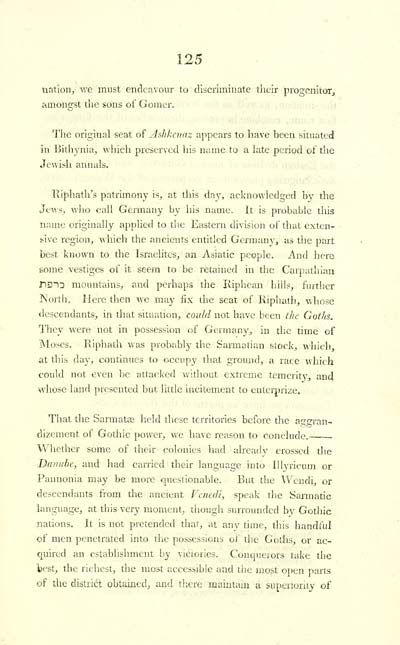Blair Collection > Celtic researches, on the origin, traditions & language, of the ancient Britons
(215)
Download files
Complete book:
Individual page:
Thumbnail gallery: Grid view | List view

125
nnîion, we must endeavour to discriminate their progcnitoTj,
amongst the sons of Gomer.
The original seat of Ashkennz appears to have been situated
in Bithj-nia, wliich preserved his name to a late period of the
Jewish annals.
Riphath's patrimony is, at this da}-, acknowledged by the
Jews_, who call Germany by his name. It is probable this
name originally applied to tiie Eastern division of that exten-
sive region, which the ancients entitled Germany, as the part
best known to the Israelites, an Asiatic people. And here
some vestiges of it seem to be retamed in the Carpathian
DDID mountains, and perhaps the Kiphcan hills, further
North, Here then we may fix the seat of Kipluith, whose
descendants, in that situation, could not have been the Goths.
They were not in possession of Germany, in the time of
Moses. Riphalh was probably the Sarmatian stock, which,
at this day, continues to occupy that ground, a race which
could not even be attacked v^'ithout extreme temerity, and
whose land presented but little incitement to enterprize.
That the Sarmatas lield dicse territories before the aijgran-
dizement of Gothic power, we have reason to conclude. .
Whether some of their colonies had already crossed the
Danube, and had carried their language into lllyricum or
Pannonia may be more questionable. But the Wendi, or
descendants from the ancient Vcnecli, speak the Sarmatic
language, at this very moment, though sm-rounded by Gothic
nations. It is not pretended that, at any time, this handful
of men penetrated into the possessions of the Goths, or ac-
quired an establishment by viciories. Conquerors take the
test, the richest, the most accessible and the most open parts
of the distiiél obtained, and there maintain a superiority of
nnîion, we must endeavour to discriminate their progcnitoTj,
amongst the sons of Gomer.
The original seat of Ashkennz appears to have been situated
in Bithj-nia, wliich preserved his name to a late period of the
Jewish annals.
Riphath's patrimony is, at this da}-, acknowledged by the
Jews_, who call Germany by his name. It is probable this
name originally applied to tiie Eastern division of that exten-
sive region, which the ancients entitled Germany, as the part
best known to the Israelites, an Asiatic people. And here
some vestiges of it seem to be retamed in the Carpathian
DDID mountains, and perhaps the Kiphcan hills, further
North, Here then we may fix the seat of Kipluith, whose
descendants, in that situation, could not have been the Goths.
They were not in possession of Germany, in the time of
Moses. Riphalh was probably the Sarmatian stock, which,
at this day, continues to occupy that ground, a race which
could not even be attacked v^'ithout extreme temerity, and
whose land presented but little incitement to enterprize.
That the Sarmatas lield dicse territories before the aijgran-
dizement of Gothic power, we have reason to conclude. .
Whether some of their colonies had already crossed the
Danube, and had carried their language into lllyricum or
Pannonia may be more questionable. But the Wendi, or
descendants from the ancient Vcnecli, speak the Sarmatic
language, at this very moment, though sm-rounded by Gothic
nations. It is not pretended that, at any time, this handful
of men penetrated into the possessions of the Goths, or ac-
quired an establishment by viciories. Conquerors take the
test, the richest, the most accessible and the most open parts
of the distiiél obtained, and there maintain a superiority of
Set display mode to: Large image | Transcription
Images and transcriptions on this page, including medium image downloads, may be used under the Creative Commons Attribution 4.0 International Licence unless otherwise stated. ![]()
| Early Gaelic Book Collections > Blair Collection > Celtic researches, on the origin, traditions & language, of the ancient Britons > (215) |
|---|
| Permanent URL | https://digital.nls.uk/75766254 |
|---|
| Description | A selection of books from a collection of more than 500 titles, mostly on religious and literary topics. Also includes some material dealing with other Celtic languages and societies. Collection created towards the end of the 19th century by Lady Evelyn Stewart Murray. |
|---|
| Description | Selected items from five 'Special and Named Printed Collections'. Includes books in Gaelic and other Celtic languages, works about the Gaels, their languages, literature, culture and history. |
|---|

